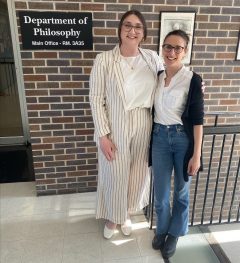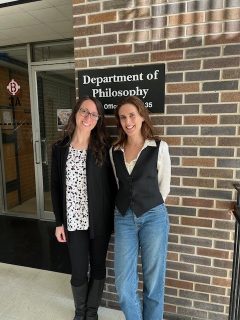We are thrilled to announce that four of our outstanding students have successfully defended their Master’s theses in Philosophy. This significant academic milestone is a testament to their hard work, intellectual rigor, and dedication to the field of philosophy.
Emily Fallows

Emily Fallows with supervisor Vida Panitch
Supervised by Professor Vida Panitch, Emily’s thesis was titled, ‘Global Equitable Vaccine Distribution: A Plan for Next Time’
Abstract
This thesis project argues that we ought to ensure a global equitable distribution of vaccines (GEDV) during a pandemic, using lessons learned from the Covid-19 pandemic. In my first chapter I argue that wealthy nations are the ones most responsible for ensuring GEDV based on their capacity and self-interest in the matter. In my second chapter I explain that wealthy nations stockpiled vaccines for themselves because of their nationalist values that prioritize the health and safety of their own citizens. In my final chapter I propose a hypothesis that we ought to try something different next time a pandemic happens, and I offer a possible solution which I call the efficient altruism principle, which states that wealthy nations ought to ensure GEDV because doing so is within their own self-interest. Achieving herd immunity through vaccination will end the pandemic sooner and, therefore, save more lives and money overall.
Regina Taptich

Regina Taptich with Supervisor Vida Panitch
Supervised by Professor Vida Panitch, Regina’s thesis was titled, ‘Health Justice and Basic Income’
Abstract
This thesis analyzes a luck egalitarian approach to health justice aimed towards neutralizing the effects of bad luck in health care outcomes. While the luck egalitarian approach rightly emphasizes the importance of individual responsibility for health choices, it must also account for the social determinants of health. In doing so, a broader approach to understanding health justice must be taken above and beyond ensuring equal access to health care resources. By addressing a key determinant (income), a form of universal basic income can address the shortcomings required for a tenable luck egalitarian account of health justice.
Ryan Oriwol

Ryan Oriwol with supervisors Andy Brook and Myrto Mylopoulos at Graduation
Supervised by distinguished research professor Andrew Brook and Professor Myrto Mylopoulos, Ryans’ thesis was titled, ‘Normative Model for Justified Public Blame’
Abstract
Public blame can take many forms, such as “cancelling” someone or posting an incriminating photo and captioning it “This you?”. I offer a method for determining when these blame judgments are justified. I review the literature on blame to uncover conditions of justification and cases where public blame is justified and cases where it is not. By contrasting cases and arguments, I discovered eight justification conditions. Five conditions for the blamed to be considered blameworthy, two conditions for the blamer to be considered blaming in good faith, and one condition focused on the purpose of the blame. With these necessary and sufficient conditions, I conclude that a public blame judgment is justified if and only if the blame is directed at a blameworthy party, in good faith, for the purpose of causing a positive change that a private blame judgment would fail to achieve or when private blame is impossible.
Gavin Foster

Gavin Foster with supervisors Andy Brook and Myrto Mylopoulos, as well as committee members Rebecca Merkley and Josh Redstone
Supervised by distinguished research professor Andrew Brook and Professor Myrto Mylopoulos, Gavin’s thesis was titled, ‘Mindreading in Great Apes: Dissolving the Logical Problem and a New Multiple Soft-Indicators Model’
Abstract
This thesis explores the debated capacity of great apes to mindread, addressing the ‘logical problem of mindreading’ and advancing an alternative ‘multiple soft-indicators’ model of mindreading. The logical problem is that no experimental protocol can be designed (even in principle) that produces evidence that supports a mindreading hypothesis, which posits the inference of unobservable mental states on the part of the ape, over a behaviour-reading hypothesis, which posits that the ape relies solely on observable cues. Challenging this, I utilize Daniel Dennett’s framework of the intentional stance to argue that mindreading does not conform to a binary classification but rather exists on a continuum, thereby dissolving the traditional logical problem by reframing it. In chapter four, I introduce a Wittgensteinian-inspired conception of ‘mindreading’ suggesting that mindreading varies in degree based on the presence and intensity of multiple soft-indicators compared to paradigmatic human cases.